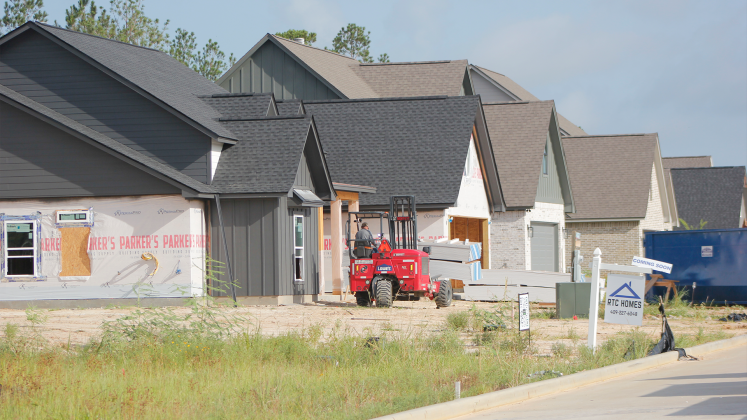State voters will head to the polls on Nov. 7 to vote on what is anticipated as the biggest property tax cut in Texas history, according to information from the governor’s office.
Last week, the Senate passed House Joint Resolution (HJR) 2, the constitutional amendment for Senator Paul Bettencourt’s (R-Houston) $18 billion property tax relief bills, Senate Bill 2 and 3. The constitutional amendment for SB 2 and SB 3 was filed as HJR 2, which passed unanimously by the Senate; the House of Representatives passed SB 2 and SB 3. The passed legislation is at this time awaiting the signature of Gov. Greg Abbott – a formality, if Abbott continues to follow-through with campaign promises.
“I promised during my campaign that the state would return to property taxpayers at least half of the largest budget surplus we have ever had,” Abbott stated.
HJR 2 will put the following on the November ballot for voters to approve:
- Increase Texas homestead exemption to $100,000 on 5.72 million Texas homeowner’s ISD property tax bills, effective on this year’s property tax bill.
- Approve a “catch-up” for over-65 and disabled for the $15,000 homestead exemption increase adjustment from May 2022 state-wide election.
- Approve non-homesteaded real property valued at $5 million and under will receive a 20% circuit-breaker on appraised value increases as a 3-year pilot project. The constitutional circuit breaker will sunset Dec. 31, 2026. (“Circiut-breaker” means a limited appraised value.)
- Three county citizens will be elected county-wide to each County Appraisal District (CAD) board of directors in non-partisan positions. The CAD board of directors will now select Appraisal Review Board (ARB) members in each county of 75,000 population or greater.
- Make sure property tax relief does not count towards constitutional spending limit.
July 10, Lt. Governor Dan Patrick and House Speaker Dade Phelan (Southeast Texas) issued a joint statement on the agreement, a historic $18 billion property tax cut.
“Reducing property taxes, providing relief to small business owners, and reforming our appraisal system will ensure economic growth and prosperity, and this agreement is a significant victory for all Texans,” Phelan said.
Bettencourt reported that SB 3 doubled the franchise tax exemption, resulting in an estimated 67,000 businesses no longer paying a franchise tax. It will also eliminate a “nuisance-tax” for 1.7 million taxpayers filing the no-tax-due forms for franchise taxes, saving businesses both time and money.
“According to the Texas Taxpayers and Research Association, the average home value in 397 of the state’s 1,014 school districts is less than $100,000, meaning that with the increased homestead exemption passed in SB 2, homeowners with a home value of $100,000 and under would no longer pay school property taxes,” stated Bettencourt.
Cait Wittman, communications director for Phelan’s office, noted the additional 10.7 cents tax compression and increased homestead exemption of $100,000 take effect as soon as the constitutional amendment passes in November.
County tax assessors should send out adjusted tax notices to reflect taxes due for 2023, according to Wittman.
Local reactions
Angela Bellard, chief appraiser for the Jefferson Central Appraisal District, said her office is watching for the governor’s signature. Bellard noted the bill contains changes that impact all Texans.
“We just got it Tuesday, so we’re trying to dig into it and figure it out,” Bellard said July 12. “The first thing is a compression rate that’s dealing with school districts. It’s the way they’re compressing the rate to save people 10% on the tax rate for school districts only, per $100 property valuation. What they are pushing for is a compressed tax rate and that will go into effect in 2023.”
Also going into effect the same year of the vote is the increase in the homestead exemption from $40,000 to $100,000. Bellard said there are two portions to the homestead exemption – the local and state.
Bellard said the state has the power for the approved amendment to go into effect immediately, if they so choose.
“We are going to certify numbers for the taxing jurisdictions and we’re going to certify two numbers to the school districts,” Bellard explained. There will be one number with the $100,000 homestead exemption and one without the $100,000 homestead exemption. “Tax bills go out in October and I’m sure the tax office is going to be prepared to do some kind of statement that will go out.
“They are going to have to do two mail-outs or do one that states those numbers.”
Bellard said homeowners have a market value and a taxable value; “The homestead exemption comes off the market value to get to the taxable value.
“The rates are applied to the taxable value.”
For example, for a house with a market value of $200,000 with a state-given $100,000 homestead exemption, the rate is not applied to the $200,000 but applied to the $100,000 remaining after the state exemption.
“If the locals had an exemption, a homeowner would take it off also,” Bellard said. The chief appraiser said she calculated the taxes on a $200,000 home and $400,000 home, and it saved each homeowner approximately $1,000 per year.
“We can go up to 20% on all non-homestead properties,” Bellard explained of the proposed circuit-breaker. “Right now, you have a 10% on your homestead properties, which is a cap. Then, in 2024, you’ll have a 20% on all non-homestead properties up to $5 million. That is only good for three years. They will have to visit it the next session to see if they are going to extend it or not.”
Jefferson County Auditor Patrick Swain said the biggest highlight from the proposed legislation is increasing the homestead exemption for school district taxes from $40,000 to $100,000.
“That’s the biggest because the state funds schools,” Swain remarked. “The state is taking their surplus and using it to lower the homeowners’ taxes, especially with the $100,000 homestead exemption.”
Swain said his office is working through some of the other details because he also believes there will be some minor changes in the future, before reaching voters.
Chief Deputy Terry Wuenschel of the Jefferson County Tax Assessor-Collector’s Office noted that her office will soon start working on the 2023 calculation for the taxing units to adopt tax rates.
“That whole process will start soon, typically in October, once we have their (tax) rates from the taxing jurisdictions,” Wuenschel said, “We’ll already have the certified values from the Appraisal District then, typically, we create the tax rolls from that and send the bills out in October.”
Wuenschel added that, for the school districts, voters could approve an increase for the homestead exemptions.
“That would require the Appraisal District to change their records and submit that to us,” Wuenschel added. “Then, we would have to redo the tax roll or make adjustments to the tax roll.”
According to Wuenschel, if the constitutional amendment goes before voters, her office would delay billing until after the election.
Concerning HJR 2, Hardin County Tax Assessor-Collector Shirley Cook told the commissioners court during their July 11 budget workshop that her office, “does not have all the mechanics of all the changes they are making.”
“It’s drastic,” Cook advised the court. “I am very concerned about this legislation and it will go into effect for the 2023; 2023 is our tax year and our budget is 2024.
“There’s going to be a lot of changes and we will have to mail out tax statements as if it has passed, even though it goes to a vote in November.”
Cook noted that, if the bill does not pass, her office will be required to send out a supplemental tax bill at the expense of the county – an estimated cost in excess of $30,000.
“We have 63,000 accounts and postage just went up,” Cook said, adding that mailed bills must also include a notice about how much the legislation saved each account in property taxes, as well as voters advisement regarding what will happen if the amendments don’t pass.


